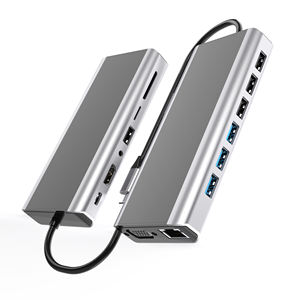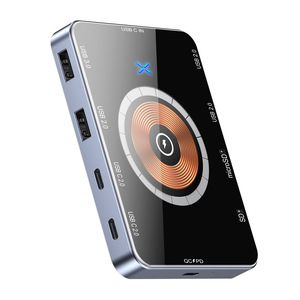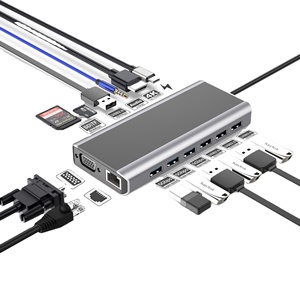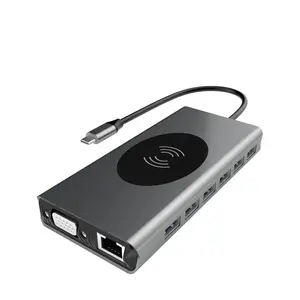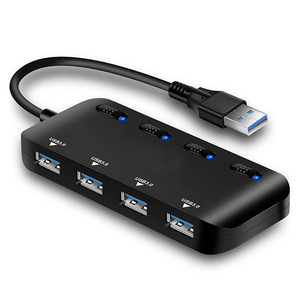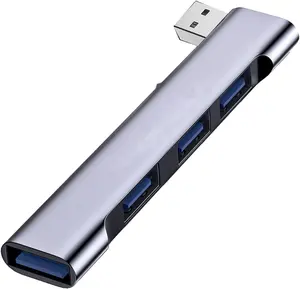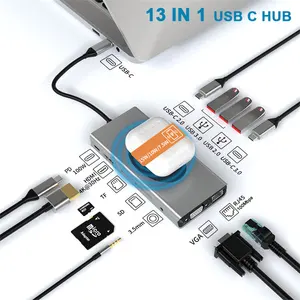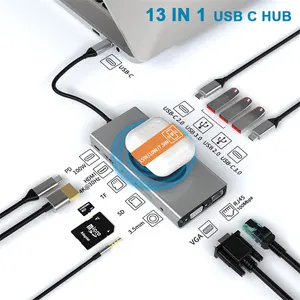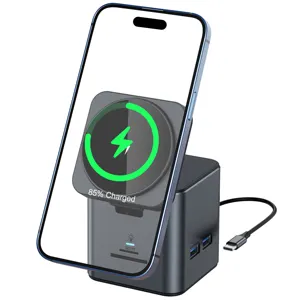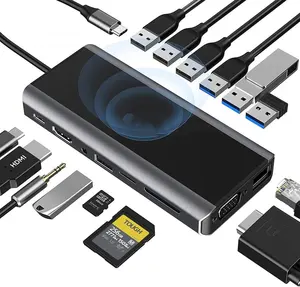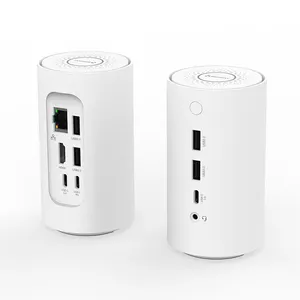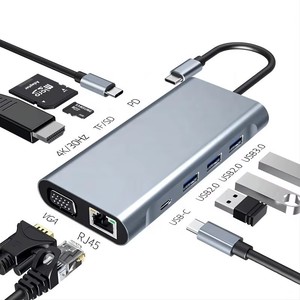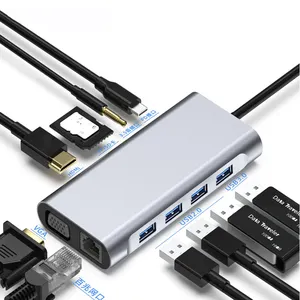Wireless Usb Hub




 1/3
1/3






 1/2
1/2


 0
0



 1/3
1/3



 1/3
1/3



 0
0




 1/3
1/3








 1/29
1/29




 1/3
1/3



 1/3
1/3


 0
0









 1/25
1/25

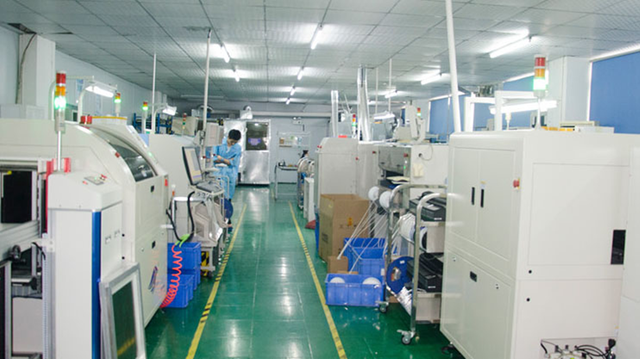

 1/3
1/3



 1/3
1/3







 1/22
1/22



 1/3
1/3


 1/1
1/1


 0
0



 1/3
1/3
About wireless usb hub
Where to Find Wireless USB Hub Suppliers?
China remains the central hub for wireless USB hub manufacturing, with key production clusters in Shenzhen, Dongguan, and Changzhou driving innovation and scale. These regions host vertically integrated supply chains specializing in consumer electronics and computer peripherals, enabling rapid prototyping and high-volume output. Shenzhen alone accounts for over 40% of China’s USB hub exports, supported by mature ecosystems of component suppliers, PCB fabricators, and logistics networks that streamline international distribution.
The industrial advantage lies in localized access to core materials such as aluminum alloy casings, USB-C controllers (e.g., VL100, RTD2142), and GaN-based power delivery modules. This integration reduces lead times to 15–25 days for standard orders and supports cost efficiencies—production costs are typically 25–35% lower than equivalent sourcing from Southeast Asia or Eastern Europe. Buyers benefit from flexible MOQs, ranging from 5 to 500 units, and widespread capabilities in surface-mount technology (SMT) assembly and automated testing.
How to Choose Wireless USB Hub Suppliers?
Selecting reliable suppliers requires a structured evaluation across technical, operational, and transactional dimensions:
Technical Capability Verification
Confirm support for essential specifications: USB 3.0/3.1 data transfer rates (5Gbps), Power Delivery (PD) up to 100W, HDMI 4K@60Hz output, and gigabit Ethernet. Suppliers should document compatibility with major operating systems (Windows, macOS, Android). For multiport hubs, verify independent circuit protection and signal integrity under load.
Production and Quality Assurance
Assess infrastructure indicators:
- Minimum 3,000m² factory area indicating scalable operations
- In-house SMT lines and functional testing equipment
- Compliance with RoHS and CE standards; ISO 9001 certification preferred
Cross-reference on-time delivery performance (target ≥96%) and response time (≤4 hours) as proxies for operational reliability.
Customization and Transaction Security
Evaluate customization depth: options may include color variants, laser logo marking, packaging design, and port configuration (HDMI, VGA, SD/TF slots). Prioritize suppliers offering third-party transaction protection and clear dispute resolution protocols. Pre-shipment inspection and sample validation are critical—test thermal performance, data throughput, and charging stability before bulk ordering.
What Are the Best Wireless USB Hub Suppliers?
| Company Name | Main Products (Listings) | Online Revenue | On-Time Delivery | Avg. Response | Reorder Rate | MOQ Range | Price Range (USD) |
|---|---|---|---|---|---|---|---|
| Shenzhen Jilian Electronic Technology Co., Ltd. | Adapters & Connectors (369), USB Hubs (67) | US $2,000+ | 100% | ≤2h | <15% | 5–10 pcs | $3.71–36.21 |
| Changzhou Halee Electronic Co., Ltd. | Customization-focused, multiple interface options | US $410,000+ | 96% | ≤4h | 20% | 5–500 pcs | $2.91–75.00 |
| Xinsheng Huizhou Technology Co., Ltd. | Mobile Accessories, Docking Stations (97+ listings) | US $10,000+ | 96% | ≤4h | <15% | 5–10 pcs | $18.90–21.00 |
| Shenzhen Yuezhi Technology Co., Ltd. | USB Hubs (410), HDD Enclosures (305) | US $50,000+ | 94% | ≤3h | <15% | 2–10 pcs | $2.83–19.90 |
| Dongguan Hifly Technology Co., Ltd. | USB Hubs (44), Projectors (21) | US $3,000+ | 100% | ≤3h | <15% | 20–50 pcs | $2.10–25.00 |
Performance Analysis
Shenzhen-based suppliers like Jilian and Yuezhi offer low MOQs and competitive pricing, ideal for small to mid-sized buyers seeking flexibility. Changzhou Halee stands out with the highest reported online revenue and broad customization capacity, including independent switches, LED indicators, and transient protection circuits—critical for premium-tier products. Despite a slightly lower on-time delivery rate (94%), Shenzhen Yuezhi demonstrates strong product diversity and scalability in USB hub design.
Dongguan Hifly and Xinsheng Huizhou focus on standardized docking solutions with consistent pricing, though higher MOQs (20–50 pcs) may limit agility. All top suppliers meet baseline compliance requirements, but only direct verification of test reports for EMI/EMC, surge protection, and thermal dissipation can ensure long-term reliability. Buyers should prioritize partners with documented quality control processes and video-verified production lines when scaling procurement.
FAQs
How to verify wireless USB hub supplier reliability?
Cross-check self-reported metrics such as on-time delivery and response time against transaction histories. Request evidence of compliance with RoHS, CE, and FCC standards. Analyze customer feedback for recurring issues related to connectivity instability or overheating.
What is the typical sampling timeline?
Standard samples are produced within 7–12 days. Custom configurations with unique housing or firmware adjustments require 15–20 days. Air shipping adds 5–8 days for international delivery.
Can suppliers support global shipping?
Yes, most manufacturers offer FOB and CIF shipping terms with coordination through freight forwarders. Confirm incoterms, customs documentation, and import duties applicable to electronic peripherals in the destination market.
Do suppliers provide free samples?
Free samples are uncommon; most charge 100% of unit cost plus shipping. Some waive fees upon confirmation of bulk orders (typically 50+ units). Negotiate sample credit redemption during final payment.
How to initiate customization requests?
Submit detailed technical drawings or reference models specifying port layout, power delivery profile, connector types, and enclosure material. Reputable suppliers will respond with engineering feasibility assessments and prototype timelines within 72 hours.



